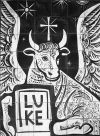
The Gospel of Luke
Pharisees and Lawyers: Lk 11,37-54
Luke has placed these woes to a much earlier point in his story than Matthew. He makes them part of developing controversy with the scribes and Pharisees (11,54) whilst for Matthew the woes are part of the final breakdown of relations towards the end of the Gospel.
The setting for Luke is a meal with just Pharisees and lawyers present. The audience in Matthew are the crowds and his disciples (23,1).
Luke begins with an initial admonition followed by three woes for Pharisees. There are then three more woes for the lawyers.
Return to the main page.
Woe to you Pharisees: Lk 11,37-44
In chapter 7, the first meal with a Pharisee brought out at the end a reluctant comment by Simon (7,43). This in contrast with this meal where the ending is now serious hostility towards Jesus by the Pharisees and scribes (11,53-54). This follows the initial breakdown of relations in 6,11.
The washing of hands in verses 38-39 is part of the clean/unclean status which runs through this section. Mark (Mk 7,1-8) explains this in detail (with specific reference to the disciples). Here, Jesus as usual is demolishing the boundaries (verse 41) which are so important to the legalists (verse 46).
Jesus's reply to his host is a strong warning, woes being warnings. As a guest, Jesus tends to take over. "Fools" is used in the Old Testament as the opposite of wisdom (Prov 1,20-22 being an example).
The inside/outside contrast climaxes with a comment about almsgiving in verse 41. Apart from the Sermon on the Mount (Mt 6,2-4), only Luke stresses the importance of almsgiving. We will be seeing Jesus' teaching in 12,33 and the almsgiving of Cornelius in Acts 10,2.
The first woe presents tithing which was originally meant to help the needy: Dt 14,22-29.
For the second woe in verse 43, not taking the seat of honour applies to all leaders and Christian leaders especially. St Paul seems a good example of true leadership as service (Gal 1,10).
For the third woe in verse 44, telling the Pharisees they are like unmarked graves recalls contact with the dead as making someone unclean (Numbers 19,16). Thus contact with the Pharisees, who claim to be the cleanest of the clean, is in practice making people unclean.
Return to the main page.
Woe also to you Lawyers: Lk 11,45-54
There is a difference between lawyers and scribes. As in 10,25, this lawyer in verse 45 calls Jesus "Teacher".
The first woe indicates how law can easily become a burden. The Jewish law, Torah or teaching, aimed to be flexible, guidelines for life. It is easy and easier to make the flexible rigid, rules which must be obeyed.
dFor the second woe in verse 47,a Israel's rejection of the prophets is a constant theme in both Testaments. Stephen for example in Acts 7,52: "which of the prophets did your ancestors not persecute?". It is possible that verse 48 is ironic: it's easier to honour dead prophets than to heed live ones.
Abel was the first to be killed in the Bible (Gen 4,8-10) and Zechariah (2 Chronicles 24,20-22) is the last.
For the third woe in verse 52, irony is again possible because the lawyers do have the key of knowledge but are not prepared to make it available.
Verses 53-54 mark a further stage in the deteriorating relations between Jesus and the Pharisees. The first break came earlier, 6,11.
My summary of all this would be:
Accusation (v38); Response (vv 39-41); Woes, Pharisees (vv 42-44); Woes, Lawyers (vv 45-52); Reaction (vv 53-54).
Let us now return to the main page and so move on to the next chapter.
